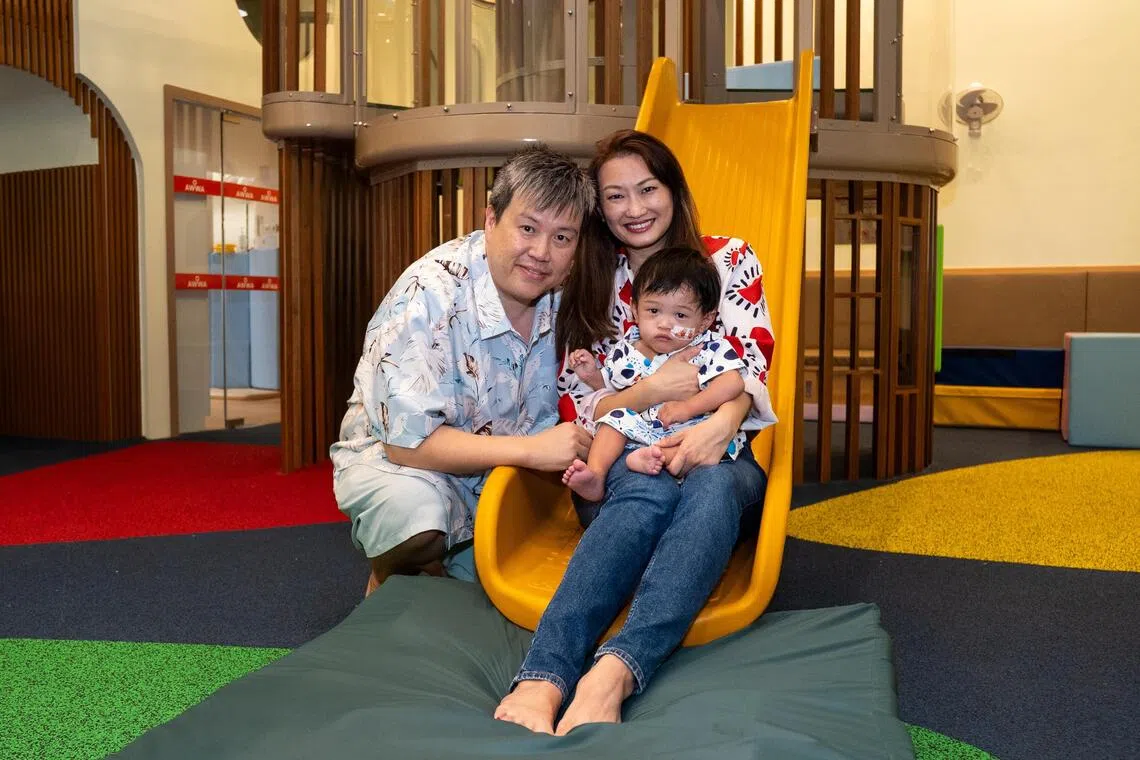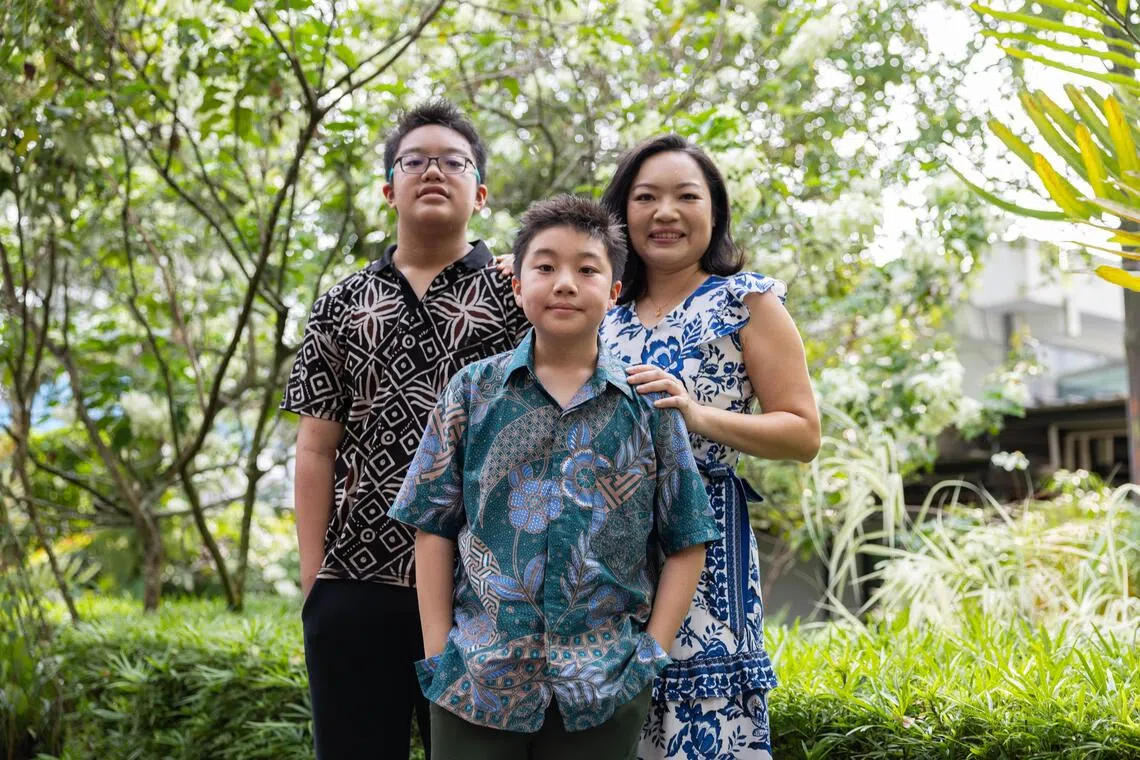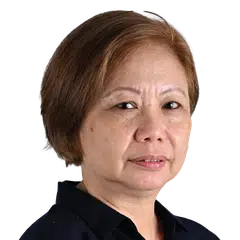KKH takes DayOne mental health programme for parents with special needs children into the community
Sign up now: Get ST's newsletters delivered to your inbox

Joshua Mark Chen was born premature at 26 weeks and this has resulted in his parents Janice Seah and John Mark Chen developing high stress and anxiety.
PHOTO: LIANHE ZAOBAO
Follow topic:
- KKH's DayOne programme expands into the community to support the mental health of parents with special needs children, where 65 per cent need support.
- KKH partners with AWWA and Allkin Singapore for community-based mental health services, funded by a $4m Lien Foundation grant from 2025-2028.
- The new phase aims to increase mental health service accessibility and simplify screening, integrating support into Early Intervention Centres.
AI generated
SINGAPORE – To help stressed and emotionally burdened parents of children with special needs before they burn out, KK Women’s and Children’s Hospital (KKH) is taking its DayOne mental health programme out of the hospital and into the community.
DayOne, piloted from 2022 to 2024 by KKH’s Department of Child Development (DCD), screened and supported parents of children with developmental needs.
In the next phase, DCD has partnered with AWWA to provide screening and support for parents whose children with special needs are enrolled in early intervention centres (EICs) run by the social service agency.
This will first be available at AWWA’s cluster of EICs in Hougang and Lorong Napiri, before being rolled out to other centres.
Parents will be screened during the enrolment process and categorised into four tiers, based on their mental health and/or psychosocial needs, and those who agree will receive tailored support services from AWWA and DCD. KKH will also continue its screening of parents.
DCD will upskill its care coordinators and medical social workers to provide this tiered mental health support for parents, from self-care guidance to targeted interventions.
Those with severe mental health needs will be referred to Allkin Mental Health Service for more intensive support. This could include parents whose children have more severe behavioural and developmental needs.
During the earlier pilot, such parents were referred to hospital-based psychiatry services, which carried some stigma. The new model aims to erase this stigma through Allkin’s community-based, non-medical service.
Such parents can continue to receive support from Allkin after their child graduates from EICs by age six.
The programme also introduces new parent-child interventions at DCD, recognising the link between parental well-being and a child’s development. Psychologists will guide parents to reduce stress and strengthen the parent-child bond.
Over 1,000 parents are expected to benefit from this free programme over three years from 2025 to 2028, thanks to $4 million in funding from the Lien Foundation.
“DayOne integrates three government-funded services, namely the DCD, EICs and community mental health services, making each more effective and efficient than if they work in isolation,” the foundation’s programme director Ng Tze Yong said.
DayOne programme director Lourdes Mary Daniel, who is also a senior consultant with KKH DCD, said: “By setting up mental health support where it is most accessible in the community, we want to create a scalable, sustainable model in the long term.”
Some 65 per cent of parents and caregivers of special needs children face significant mental health struggles and require professional support.
They often ride a mental and emotional roller coaster, experiencing high levels of stress and anxiety, as well as feelings of guilt, resentment and isolation.
Ms Janice Seah, 41, a corporate communications executive, cares for her 12-month-old son Joshua Mark Chen, who was born prematurely at 26 weeks and has developmental and lung issues.
“When he was discharged from the hospital and came home, his father and I were always by his side, checking on his oxygen level and whether he was feeding well,” she recalled.
“I was constantly on high alert because I had to ensure my son’s survival. I even came up with a checklist for myself when it came to him,” Ms Seah said, adding that she felt more like his doctor than his mother.
“I did not realise that I needed help until I was assessed at DayOne and was told I needed to voice it out – that I needed help, that my family was not doing well. Of course, I was hesitant, but later, I found speaking to a third party helped,” she said.
Ms Seah enrolled in DayOne in August and first saw Ms Shalini Elangovani, a senior psychologist at AWWA, on Sept 3. She currently sees her counsellor once every two weeks.
Parents whose children are too old for EICs and DayOne also should not suffer in silence.
Ms Julia Chan, 41, said she tried to be stoic when she first found out in 2016 that her elder son Jedi Chen, now 13, is autistic.
Ms Chan, who was handling social media for a company then, felt the cumulative weight of his medical appointments, therapies and caregiving.

Ms Julia Chan said she was like a mobile phone with many apps open when caring for her sons Jedi Chen (left) and Javian Chen.
ST PHOTO: BRIAN TEO
The pressure from both work and caring for Jedi and her second baby Javian took a toll, and she started having tension headaches, sleepless nights and stress-induced breathing difficulties.
“I went into hyperdrive, and was like a mobile phone with many apps open all at once,” said Ms Chan, who now heads a community services organisation.
Javian, now 11, has attention deficit hyperactivity disorder and anxiety.
Ms Chan said she would cry in the bathroom, but would not let anyone see her vulnerability or that she was overwhelmed. Her sons are past the age for EICs so she does not come under DayOne, but parents like her can still be referred to Allkin for specialised care as a general client.
“Caregiver support has always been at the heart of AWWA’s work,” its chief executive J.R. Karthikeyan said.
“Through DayOne Phase II, we are deepening our focus on mental health, ensuring that caregivers of children with developmental needs receive the support they need, early and consistently.”
Allkin Singapore CEO Fareez Fahmy said parents of children with developmental needs often prioritise their child’s well-being over their own.
“By working closely with KKH DCD and AWWA EICs, we are ensuring that mental health care follows them beyond the hospital and into their homes and communities.”


